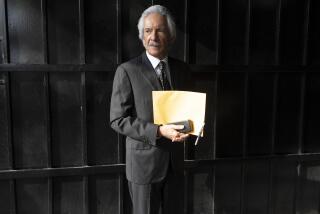Press Freedoms Eroding in Chile, Journalists Charge
- Share via
SANTIAGO, Chile — By day, Juan Pablo Cardenas edits a weekly magazine that openly opposes the military government of President Augusto Pinochet. By night, Cardenas sleeps behind bars, serving out a prison sentence for defamation of the president.
Cardenas and other editors say a hardening of government policy and tougher prosecution under a growing array of restrictive laws are adding new risks to the free practice of journalism in Chile. Increasingly, they say, the limited press freedom permitted under Pinochet’s 14-year dictatorship is a freedom under pressure.
Pressures on the Chilean press will be spotlighted this week during a meeting here of the Inter American Press Assn. (IAPA). This is the first time the organization of Western Hemisphere editors and publishers has met in Chile since 1972, when the government was led by Marxist President Salvador Allende.
Address by Pinochet
Pinochet, who seized power in September, 1973, has accepted an invitation to speak to the IAPA on Wednesday. Before the organization hears the president, however, it will discuss a report that promises to be critical of his press policy.
In the meeting, the Cardenas case will be used as one of many examples to show increasing restrictions faced by the handful of Chilean publications--two daily newspapers and four newsmagazines--that do not support Pinochet’s government.
Cardenas, 37, was charged with defaming the president, a violation of the national security law, in a series of articles he wrote and published in his magazine, Analisis. The articles emphasized alleged violations of human rights by the government.
Cardenas won an appeal against an initial sentence, but the government appealed to the Supreme Court, which almost always rules in its favor. The Supreme Court handed Cardenas the unusual sentence of 541 nights in jail.
“They (his wife and six children) are well aware that this is the price that I pay and they pay for freedom of expression,” he said at his desk in a two-story house that serves as headquarters for the 10-year-old magazine.
When Cardenas finishes his current sentence, he must serve one year’s parole for “offending the army.” He also is being tried, together with the editors of another opposition magazine and two newspapers, for publishing a paid notice by the banned Communist Party in July.
Analisis reporter Monica Gonzalez is on trial for violating the state security law with a September interview in which Andres Zaldivar, a Christian Democratic leader, harshly criticized Pinochet. Free on recognizance after being held for 10 days, Gonzalez could be sentenced to 18 months in prison.
Fernando Paulsen, assistant editor of Analisis, said the prosecution of Gonzalez sets an intimidating precedent by holding a reporter responsible for what an interview subject says.
“I am sure that many journalists are not willing to ask Zaldivar what he thinks of Pinochet again,” Paulsen said.
Emilio Filippi, editor of the newspaper La Epoca, said that more than 20 journalists currently face government prosecution on a variety of charges such as offending authorities and violating national security.
“There has been an increase in the repression of the press in recent months,” Filippi said.
On Monday, Filippi will present a report on Chile for the IAPA’s Committee on Freedom of the Press. He said his conclusion will be that “even though there are opposition media, there is no freedom of the press in Chile.”
A law enacted in October prohibits news media from quoting the opinions of persons belonging to banned Marxist parties. Three Chilean parties, including the Communist Party, were ruled illegal in 1985 because of their “totalitarian” orientation, which violates Pinochet’s 1980 constitution.
More to Read
Sign up for Essential California
The most important California stories and recommendations in your inbox every morning.
You may occasionally receive promotional content from the Los Angeles Times.










